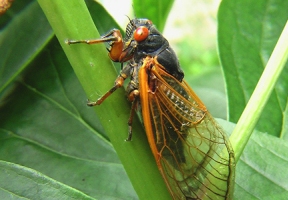
The Cook County Department of Animal and Rabies Control (ARC) urges pet owners to take special precautions to protect the health and welfare of their pets this spring and summer as two different groups of periodic cicadas emerge simultaneously. This natural phenomenon hasn’t taken place in more than 200 years, as billions of cicadas are expected to emerge in Illinois in late May or early June. ARC offers the following tips for pet owners to keep in mind:
Cicadas can startle pets: Cicadas do not bite or sting, are not toxic to pets and are not known to carry diseases, so interactions are generally safe. However, the noise, size and movements of cicadas may be startling to some pets. If a pet seems scared, owners should try to direct them to an area with less cicadas like a comfortable and quiet place inside the home to relax.
Keep your pet on a leash: In Cook County, dogs must be leashed when outdoors unless in a designated, dog-friendly area. Keeping pets on a leash could prevent a startled pet from accidentally getting away as well as help to prevent overconsumption of insects, bites, cuts or other hazards.
Monitor cicada consumption: While cicadas aren’t toxic to pets, gastrointestinal upset can occur if a pet consumes too many cicadas or their discarded “shells” (exoskeletons). Intestinal obstruction or perforation could occur as exoskeletons move through the gastrointestinal tract, particularly if a small pet consumes many cicadas in a short period of time.
Owners should monitor their pets outside to be sure they are not consuming too many cicadas. If a pet starts experiencing vomiting, diarrhea, loss of appetite or excessive drooling, owners should seek veterinary care. If your pet appears to be in distress, contact your veterinarian for further guidance.










